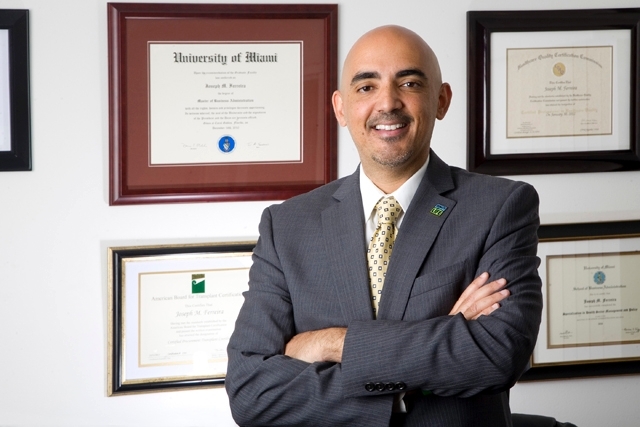Q&A with Joseph Ferreira, president and chief executive officer, Nevada Donor Network

It’s only been a year since Joseph Ferreira migrated from south Florida to take the reins of the Nevada Donor Network and recent figures produced by the nonprofit procurement organization already reflect his success.
The CEO and president of the Donor Network took over an underperforming organization that was struggling to meet federal regulations in April 2012.
In the short time Ferreira has overseen the procurement network, he has unquestionably contributed to the following figures: From 2011 through 2012, the number of transplanted intestines jumped 400 percent, kidney procurement increased by 30 percent and the number of transplanted livers jumped 24 percent.
“We are performing better as an organization than we have ever performed in our history,” Ferreira said.
Although the statistics are impressive, Ferreira acknowledges he and the organization still have potential for improvement.
Compared with the rest of the United States,
how generous are Nevadans when it comes to donating?
We’ve seen an increase in the last 12 to 16 months, but in terms of their willingness to register in the state of Nevada, only 40 percent of adults are registered. We are currently ranked 40th in the country. There are a lot of opportunities out there to raise awareness.
What are the most common misperceptions about donation?
The most common one we here in Nevada is if they had it (their registration) on their license or they express their wishes to their family or the medical community that the hospital staff won’t do the utmost to save their lives and that couldn’t be further from the truth. The ethics and the practice of the medical community prevent premature discussions about donations. If they can’t save someone’s life, there are discussions with the family, documents are reviewed and the registration is brought to light. That is a two- or three-day process.
What type of technological advancements have you witnessed in the past decade?
We have been involved with some unique initiatives with a series of cases that involved new perfusion technology for hearts and lungs. The prospects for these technologies might allow us to recover and transplant more hearts and lungs. It extends the time between procurement and transplants (by up to three times). We were the first OPO (Organ Procurement Organization) in the country to facilitate the recovery and transplantation for the perfusion of lungs. Process improvements are really something we are focused on. We are striving to be a world-class OPO.
Do organs procured from Nevada residents stay in Nevada?
No, the way the system is set up, the preference is given to most critical patients first (regardless of their location in the U.S.). In the state of Nevada, we only have a kidney transplant center. All other organs – hearts, lungs, livers, intestines, pancreas — those don’t occur in Nevada. They’re exported to other centers that do perform those surgeries.
Is this one of the most rewarding professions around?
There is no question. The obvious one is that we as an organization have the ability to directly impact the lives of people awaiting these transplants. It is heart-wrenching; 18 people die every day waiting for these organs. But people also go from being literally very sick, sometimes on the brink of death, to receiving the gift of life. We still have some work to do in Nevada, educating the community and making sure we’re increasing the number of people who are registered donors.